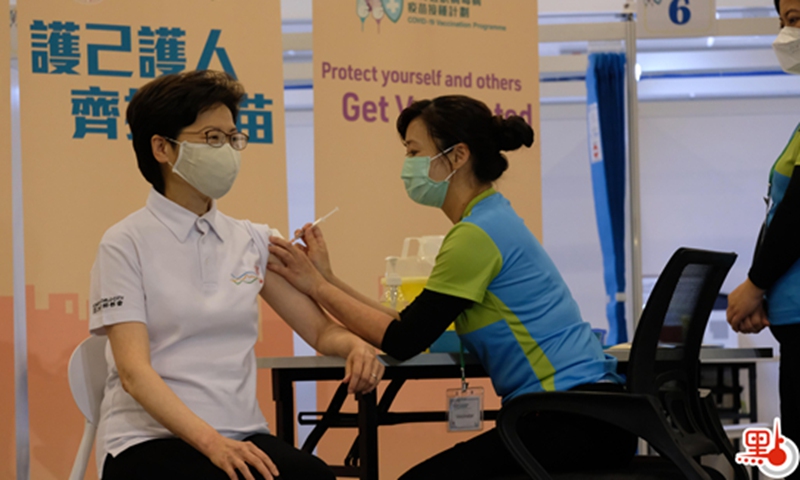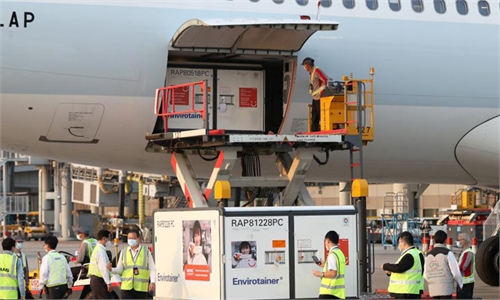Carrie Lam takes 1st shot of Sinovac vaccine in live broadcast
Officials’ inoculation can encourage public: experts

Hong Kong Special Administrative Region Chief Executive Carrie Lam takes her first shot of the Chinese mainland-developed Sinovac COVID-19 vaccines on Monday. Photo: takungpao.com
Hong Kong Special Administrative Region (HKSAR) Chief Executive Carrie Lam and several secretaries including Teresa Cheng Yeuk-wah (Secretary of Justice) and Matthew Cheung Kin-chung (Chief Secretary of Administration) took their first shot of the Chinese mainland-developed Sinovac COVID-19 vaccines in a live broadcast on Monday afternoon.
Observers said the vaccination of senior officials, including Teresa Cheng Yeuk-wah (Secretary of Justice) and Matthew Cheung Kin-chung (Chief Secretary of Administration, can encourage members of the public to join the vaccination program more actively.
After taking her first jab and resting for about half an hour for medical observation, Lam said at a press conference that the vaccine brings light in the fight against the epidemic.
Most HKSAR secretaries took the shots as well. Local media said Financial Secretary Paul Chan Mo-po did not receive the vaccine on Monday as he was busy preparing for the budget to be announced on Wednesday. He will be vaccinated next week, media reports said.
Edward Yau Tang-wah, secretary for Commerce and Economic Development and Wong Kam-sing, secretary for the Environment, didn't attend the event either due to other official business. They will take the vaccine at a later date, local media reported.
The first batch of 1 million doses of the Sinovac vaccines arrived in Hong Kong on Friday, and the first batch of 1 million doses co-developed by Chinese company Fosun and German vaccine producer BioNTech will arrive by the end of February.
Authorities said they will launch online reservations for vaccinations on Tuesday, and the vaccination program will start on February 26. The vaccination is free of charge in Hong Kong.
Lam said at the press conference after being vaccinated , she "feels very good."
Lam thanked China's central government for supporting HKSAR in its anti-epidemic work, scientists at home and abroad for developing vaccines, and local medical experts for fighting against the COVID-19 outbreak.
She also called on the public to actively sign up for vaccination.
Lam stressed that now was not the time to relax, and she hoped that there would not be a new wave of the epidemic, so that the resumption of businesses and schools could continue.
Many schools were allowed to resume face-to-face instruction as of Monday. So far, about 200 schools in the city have successfully applied for the full resumption of classes.
Lam said that the vaccine brings light in the fight against the epidemic.
However, some people and media reports have accused the Hong Kong government of lowering standards for authorizing the Sinovac vaccines. In response, the HKSAR government said on Thursday that the accusation was not truthful.
Feng Duojia, president of the China Vaccine Industry Association, told the Global Times that the accusation was made out of prejudice against Chinese mainland-made products.
Some Hong Kong people may not know enough about mainland vaccines as Hong Kong usually uses overseas vaccines, but with an increasing number of residents receiving the Sinovac vaccines, more Hong Kong people will show their confidence in mainland-produced COVID-19 vaccines, Feng said.
Observers said that the sight of Hong Kong senior officials taking the COVID-19 vaccine has set a good example for the public, and it can encourage more residents to join the vaccination program.
Lawrence Tang Fei, a member of the Chinese Association of Hong Kong and Macao Studies and also principal of Hong Kong's Heung To Secondary School, told the Global Times on Monday that "I will definitely take shots" when the vaccination is available for the public.
He doesn't object to domestic vaccines, Tang said, noting that he will choose which to take after comparing the vaccines' efficacy data.
However, he was not positive that many teachers - especially those belonging to the Hong Kong Professional Teachers' Union (HKPTU) - would join the vaccination program, as their political discord and mistrust might be projected onto vaccines. The HKPTU was formed on the basis of pro-secessionism as early as 1973, and it has been supporting secessionist activities ever since.
Several Hong Kong residents reached by the Global Times took a wait-and-see attitude toward the vaccination program, although they noted that they were not resisting the vaccination drive.
A resident surnamed Zhang, born in Southwest China's Chongqing Municipality and now working in Hong Kong, expressed her concerns over the possible side effects of vaccines.
"I will wait and see. If people around me who get shots don't develop serious side effects, I will apply to be vaccinated. But now I just wear a mask when I go out and keep social disdancing," Zhang said.
Zhang, who is an assistant to an HKSAR member of the Chinese People's Political Consultative Conference, said the political advisor has already taken the COVID-19 vaccine ahead of two sessions - China's most important annual political events, which will convene on March 4 in Beijing.
National People's Congress deputies and CPPCC members from the HKSAR said they would submit 22 proposals and suggestions this year, including requesting more domestic vaccines and allowing Hong Kong residents who have been vaccinated and developed antibodies and are going to the mainland to be exempt from quarantine, so as to resume normal cross-border travels at an early date.
Several associations in Hong Kong jointly conducted a survey of 930 medical workers from January 7 to 14 and found that 78 percent of the respondents said they would like to take the vaccine while only 5 percent expressed reluctance, several local media outlets including mingpao.com reported.
Of the respondents, 61 percent chose Sinovac's inactivated vaccines and 22 pecent chose BioNTech's mRNA vaccines.



